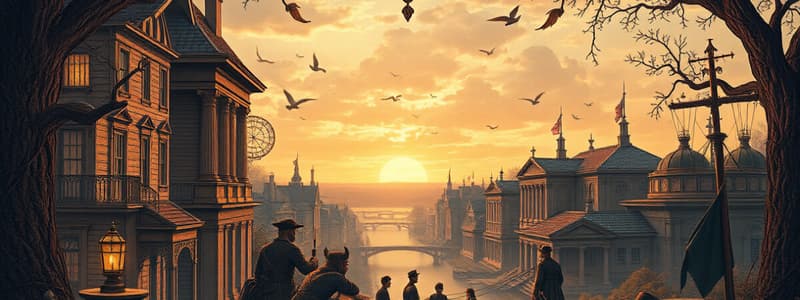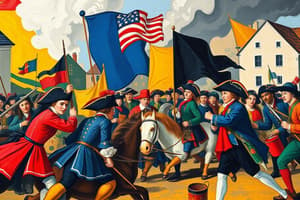Podcast
Questions and Answers
What does 'no taxation without representation' mean?
What does 'no taxation without representation' mean?
It means that the colonists didn't think they should be taxed unless they had representation in the British Parliament.
What did the Proclamation of 1763 prohibit?
What did the Proclamation of 1763 prohibit?
It prohibited the colonists from moving west of the Appalachian Mountains.
What U.S. document included a long list of colonial grievances against British King George the Third?
What U.S. document included a long list of colonial grievances against British King George the Third?
The Declaration of Independence.
What act was passed by Parliament in order to stop smuggling between the colonies and the West Indies?
What act was passed by Parliament in order to stop smuggling between the colonies and the West Indies?
Why did the American colonists protest the Stamp Act of 1765, Townshend Acts 1767, Tea Act 1773, and the Coercive Acts 1774?
Why did the American colonists protest the Stamp Act of 1765, Townshend Acts 1767, Tea Act 1773, and the Coercive Acts 1774?
What are unalienable rights?
What are unalienable rights?
What act eventually led colonists to board British ships and dump tea into Boston Harbor?
What act eventually led colonists to board British ships and dump tea into Boston Harbor?
Name four methods colonists used to protest unfair policies of the British government.
Name four methods colonists used to protest unfair policies of the British government.
What act placed a tax on newspapers?
What act placed a tax on newspapers?
Who led the group of colonists known as the Sons of Liberty?
Who led the group of colonists known as the Sons of Liberty?
Who helped start the Sons of Liberty?
Who helped start the Sons of Liberty?
What was the Daughters of Liberty?
What was the Daughters of Liberty?
What did the Townshend Acts impose taxes on?
What did the Townshend Acts impose taxes on?
What is a boycott?
What is a boycott?
What was the Boston Massacre?
What was the Boston Massacre?
Who was Crispus Attucks?
Who was Crispus Attucks?
Name two events Paul Revere is associated with.
Name two events Paul Revere is associated with.
What were the Committees of Correspondence?
What were the Committees of Correspondence?
Name three groups Samuel Adams is associated with.
Name three groups Samuel Adams is associated with.
What is the Tea Act of 1773?
What is the Tea Act of 1773?
What are the Coercive Acts?
What are the Coercive Acts?
Name four causes of the Revolutionary War.
Name four causes of the Revolutionary War.
What are minute men?
What are minute men?
Who were the two patriots who rushed to warn the colonists that the British were coming?
Who were the two patriots who rushed to warn the colonists that the British were coming?
Where were the first two battles of the Revolutionary War fought?
Where were the first two battles of the Revolutionary War fought?
Who wrote the Concord Hymn?
Who wrote the Concord Hymn?
What famous saying is found in the Concord Hymn?
What famous saying is found in the Concord Hymn?
What did the 'shot heard round the world' signify?
What did the 'shot heard round the world' signify?
Who won the Battle of Bunker Hill?
Who won the Battle of Bunker Hill?
Why did American Colonel Prescott shout 'don't shoot before you see the whites of their eyes'?
Why did American Colonel Prescott shout 'don't shoot before you see the whites of their eyes'?
What is a loyalist?
What is a loyalist?
What are patriots?
What are patriots?
What did the Continental Congress create to fight the British?
What did the Continental Congress create to fight the British?
Who was the commander of the Continental Army?
Who was the commander of the Continental Army?
What is the Olive Branch Petition?
What is the Olive Branch Petition?
Who wrote to John Adams about America's independence and equality to women?
Who wrote to John Adams about America's independence and equality to women?
What two pamphlets did Thomas Paine write?
What two pamphlets did Thomas Paine write?
What did Common Sense call for?
What did Common Sense call for?
Who wrote the Declaration of Independence?
Who wrote the Declaration of Independence?
According to the Declaration of Independence, give three examples of unalienable rights.
According to the Declaration of Independence, give three examples of unalienable rights.
What does the first part of the Declaration of Independence explain?
What does the first part of the Declaration of Independence explain?
What does the second part of the Declaration of Independence talk about?
What does the second part of the Declaration of Independence talk about?
What does the third part of the Declaration of Independence discuss?
What does the third part of the Declaration of Independence discuss?
What does the final part of the Declaration of Independence declare?
What does the final part of the Declaration of Independence declare?
What does self-evident mean in the Declaration of Independence?
What does self-evident mean in the Declaration of Independence?
What did Thomas Jefferson mean by 'endowed by their creator'?
What did Thomas Jefferson mean by 'endowed by their creator'?
What is referred to by 'Governments are instituted among Men'?
What is referred to by 'Governments are instituted among Men'?
According to the Declaration of Independence, from where do governments receive their powers?
According to the Declaration of Independence, from where do governments receive their powers?
Flashcards are hidden until you start studying
Study Notes
Key Terms and Definitions
- "No taxation without representation" expresses the colonists' belief that they should not be taxed without having representatives in British Parliament.
- The Proclamation of 1763 restricted colonists from settling west of the Appalachian Mountains.
- The Declaration of Independence lists colonial grievances against King George III, asserting the colonies' desire for independence.
- The Sugar Act of 1764 aimed to eliminate smuggling between the colonies and the West Indies by imposing taxes.
- The protests against the Stamp Act, Townshend Acts, Tea Act, and Coercive Acts were fueled by hardships imposed on daily life for colonists without representation.
- Unalienable rights are those that cannot be revoked without due process, such as life, liberty, and the pursuit of happiness.
Significant Events and Acts
- The Tea Act instigated the Boston Tea Party, where colonists famously dumped tea into the harbor in protest.
- Colonists employed various protest methods, including boycotts, burning effigies, and organizing groups like the Sons and Daughters of Liberty.
- The Stamp Act of 1765 imposed a tax on newspapers, directly affecting communication and expression.
- The Boston Massacre involved British soldiers killing five protesting colonists, escalating tensions between Britain and the colonies.
Key Figures
- Samuel Adams, a prominent leader, helped establish the Sons of Liberty, advocating for colonial rights.
- The Daughters of Liberty promoted homemade goods to boycott British imports during the Townshend Acts.
- Crispus Attucks, part African and part Native American, was the first casualty of the Boston Massacre.
- Paul Revere, alongside William Dawes, alerted colonists of British troop movements with the famous phrase "the British are coming."
Revolutionary War Context
- The first battles of the Revolutionary War were fought at Lexington and Concord, marking the start of armed conflict.
- The "shot heard round the world" signifies the global impact of the Americans' fight for independence.
- George Washington was appointed commander of the Continental Army, leading the fight against British forces.
Declaration of Independence
- Written by Thomas Jefferson, the Declaration articulates the colonies' intention to establish a separate government.
- The document contains three main parts: the introduction outlining the need for a new government, the explanation of natural rights, and a list of grievances against the king.
- The phrase "self-evident" indicates the belief that certain truths, like the right to life and liberty, are obvious and universally acknowledged.
- The Declaration emphasizes that governments derive their powers from the consent of the governed.
Ideals and Concepts
- Loyalists were colonists who remained supportive of the British monarchy, while patriots sought independence from it.
- Committees of Correspondence were formed to facilitate communication and coordination among the colonies regarding British actions.
- The Coercive Acts aimed to punish Massachusetts for the Boston Tea Party, including prohibiting town meetings.
- "Minute men" were local militia members prepared to respond quickly to threats, showcasing the colonies' readiness for conflict.
Influence and Legacy
- Abigail Adams advocated for women's rights and equality during the fight for independence in her correspondence with John Adams.
- Thomas Paine’s pamphlets "Common Sense" and "The American Crisis" called for independence and rallied support for the revolutionary cause.
Studying That Suits You
Use AI to generate personalized quizzes and flashcards to suit your learning preferences.




